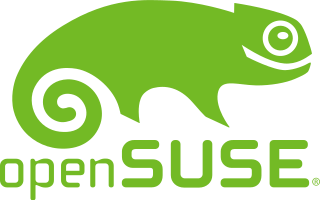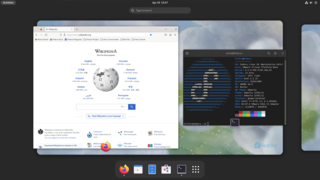
GNOME Evolution is the official personal information manager for GNOME. It has been an official part of GNOME since Evolution 2.0 was included with the GNOME 2.8 release in September 2004. It combines e-mail, address book, calendar, task list and note-taking features. Its user interface and functionality is similar to Microsoft Outlook. Evolution is free software licensed under the terms of the GNU Lesser General Public License (LGPL).

An embedded operating system is an operating system for embedded computer systems. Embedded operating systems are computer systems designed to increase functionality and reliability for achieving a specific task. Depending on the method used for Computer multitasking, this type of operating system might be considered a real-time operating system (RTOS).

openSUSE is a free and open source RPM-based Linux distribution developed by the openSUSE project.

Maemo is a software platform originally developed by Nokia, now developed by the community, for smartphones and Internet tablets. The platform comprises both the Maemo operating system and SDK. Maemo played a key role in Nokia's strategy to compete with Apple and Android, and that strategy failed for complex, institutional and strategic reasons.

NetworkManager is a daemon that sits on top of libudev and other Linux kernel interfaces and provides a high-level interface for the configuration of the network interfaces.

gNewSense was a Linux distribution, active from 2006 to 2016. It was based on Debian, and developed with sponsorship from the Free Software Foundation. Its goal was user-friendliness, but with all proprietary and non-free software removed. The Free Software Foundation considered gNewSense to be composed entirely of free software.

In the 1950s and 1960s, computer operating software and compilers were delivered as a part of hardware purchases without separate fees. At the time, source code, the human-readable form of software, was generally distributed with the software providing the ability to fix bugs or add new functions. Universities were early adopters of computing technology. Many of the modifications developed by universities were openly shared, in keeping with the academic principles of sharing knowledge, and organizations sprung up to facilitate sharing. As large-scale operating systems matured, fewer organizations allowed modifications to the operating software, and eventually such operating systems were closed to modification. However, utilities and other added-function applications are still shared and new organizations have been formed to promote the sharing of software.

Fedora Linux is a Linux distribution developed by the Fedora Project. It was originally developed in 2003 as a continuation of the Red Hat Linux project. It contains software distributed under various free and open-source licenses and aims to be on the leading edge of open-source technologies. It is now the upstream source for CentOS Stream and Red Hat Enterprise Linux.

Moblin, short for 'mobile Linux', is a discontinued open source operating system and application stack for Mobile Internet Devices (MIDs), netbooks, nettops and embedded devices.

Go-oo is a discontinued free office suite which started as a set of patches for OpenOffice.org, then later became an independent fork of OpenOffice.org with a number of enhancements, sponsored by Novell.

Bharat Operating System Solutions is an Indian Linux distribution based on Debian, with Its latest stable version is 9.0 ("Urja") which was released in February 2021.
OpenWrt is an open-source project for embedded operating systems based on Linux, primarily used on embedded devices to route network traffic. The main components are Linux, util-linux, musl, and BusyBox. All components have been optimized to be small enough to fit into the limited storage and memory available in home routers.
Fedora Linux is a popular Linux distribution developed by the Fedora Project. Fedora attempts to maintain a six-month release schedule, offering new versions in May and November, although some releases have experienced minor delays.

Antergos is a discontinued Linux distribution based on Arch Linux. By default, it includes the GNOME desktop environment, but it also offers options for Cinnamon, MATE, KDE Plasma 5, Deepin, and Xfce desktops. Originally released in July 2012 as Cinnarch, it quickly gained popularity and was ranked among the top 40 most popular distributions on DistroWatch by June 2013. The name Antergos derived from the Galician word for ancestors, was chosen to "to link the past with the present".

Zorin OS is a Linux distribution based on Ubuntu. It uses a GNOME 3 and XFCE 4 desktop environment by default, although the desktop is heavily customized in order to help users transition from Windows and macOS easily. Wine and PlayOnLinux are supported, allowing users to run compatible Windows software, like Microsoft Office. Its creators maintain three free editions of the operating system, and sell a professional edition.

Phosh is a graphical user interface designed for mobile and touch-based devices and developed by Purism. It is the default shell used on several mobile Linux operating systems including PureOS, Mobian, and Fedora Mobility. It is also an option on postmarketOS, Manjaro, and openSUSE.













